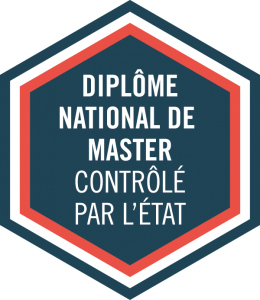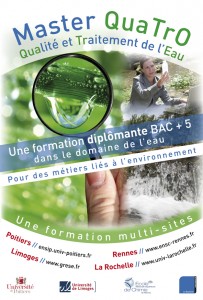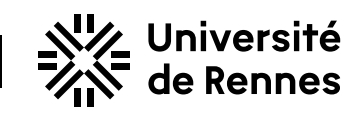This course is aimed at students having completed:
 a 1st year in Master of Chemistry, Physique Chemistry, Material Sciences, or Physical Sciences,
a 1st year in Master of Chemistry, Physique Chemistry, Material Sciences, or Physical Sciences,
a 2nd year in MSc Chemistry, Physical or Material Chemistry,
a 2nd year at the Ecole Nationale Supérieure d’Ingénieurs in Chemistry or Physical Chemistry,
a 4th year at the Institut National des Sciences Appliquées,
any other equivalent qualification.
Three specialities are offered by the ENSCR:

Speciality Molecular Chemistry
Speciality Chemistry of Solids and Materials
Speciality Water Quality and Treatment (QuaTrO)
Molecular Chemistry Master
Jointly accredited establishments
University of Rennes 1
Ecole Nationale Supérieure de Chimie in Rennes (ENSCR)
Aims
The aim of this research master with the speciality “Molecular chemistry” (M2 – CM) is to train students with high-level knowledge in the fields of the synthesis of organic and organometallic molecules, their structural analysis and the study of their physico-chemical or biological properties. The modular structure of this course enables students to probe more deeply, depending on their professional plans, into one of the following four aspects: fine chemistry, Molecular and Supramolecular engineering, Chemistry of the living world, Theoretical chemistry.
Teaching
The M2 – CM covers two terms, the first devoted to theoretical teaching and the second to a placement for initiation into research.
TERM 1
From mid-September to the end of January: 216 hours of science teaching in six teaching units (UE) of 36 hours each. These UEs lead to a written exam, the first session of which is held at the end of January.
Provisions that apply to student-engineers at the ENSCR
Four UEs chosen from among all the UEs of the master
Strategies of synthesis and Heterochemistry
Catalysis for fine chemistry
New technologies in fine chemistry
Molecular and Supramolecular engineering
Photonics and molecular electronics
Quantum chemistry, electronic structure of molecules and applications
Organised molecular systems, from use to design
Design and synthesis of bioactive molecules
The contribution of chemistry and biochemistry to understanding the living world
The vocational aspects of the master 2 will be monitored as part of the engineering course and marked according to the methods of knowledge assessment decided by the Board of Trustees of the ENSCR.
The methods of knowledge assessment for CM Master
General provisions that apply to students holding an M1 and only enrolled for the M2 course:
Students must pursue six of the nine UEs on offer in the compulsory core curriculum:
Strategies of synthesis and heterochemistry
Catalysis for fine chemistry
New technologies in fine chemistry
Molecular and Supramolecular engineering
Molecular photonics and electronics
Quantum chemistry, electronic structure of molecules and applications
Organised molecular systems, from use to design
Design and synthesis of bioactive molecules
The contribution of chemistry and biochemistry to understanding the living world
To these are added what we call vocational training consisting of:
1 compulsory UE in languages (English)
2 UEs chosen from among the following::
– Job-finding techniques – Quality Assurance
– Marketing finance
– Logistics – Production Management – Strategy
– Employment law and management of human resources
These UEs lead to a written exam, the first session of which is held at the end of January.
TERM 2
An introductory research placement in one of the host laboratories of the Research Master or in a company, from February to the end of June. The placement represents 30 ECTS and is completed by a written report presented orally at the end of June.
Host laboratories
The introductory research placement, lasting 5 months minimum, can take place in any public or private research laboratory, in France or abroad, so long as the subject of the placement is compatible with the training of the student.
Each year, the ENSCR research laboratories offer numerous placement opportunities, in teams that are nationally and internationally recognised. These laboratories have long experience in the field of molecular chemistry (catalysis and fine chemistry, bioactive molecules and organised systems) and are recognised for the quality of their work.
Overall, the potential of academic research offered in Rennes for student training brings together all the laboratories in jointly accredited establishments, specialising in this field. Most of the host places in Rennes are members of a mixed research unit linked to the CNRS: UMR CNRS 6226 «Institut des Sciences Chimiques de Rennes».
Useful link: Training website
Contact concerning the master degree:
thierry.benvegnu@ensc-rennes.fr,Master’s in Chemistry of Solids and Materials
Jointly-accredited establishments
University of Rennes 1
Institut National des Sciences Appliquées de Rennes (INSA)
Ecole Nationale Supérieure de Chimie de Rennes (ENSCR)
Aims
The research master with the speciality “Chemistry of solids and materials” (M2 – CSM) is aimed at students who already have good knowledge of the chemistry of solids, inorganic chemistry and physico-chemistry. Its aims are: To meet the need to train researchers and engineers wishing to work in the sector of materials,
To reinforce their acquisition of skills, from the synthesis of new compounds to the development of existing materials to improve their properties,
To develop a range of abilities in the techniques of analysing and characterising materials,
To prepare for further studies towards a doctorate within laboratories offering placements for a Master’s degree, or in major national and international groups,
To help students take up a professional career at a high level of qualification.
Teaching
The M2 – CSM covers two terms, the first devoted to theoretical teaching and the second to a placement for initiation into research.
TERM 1
From mid-September to the end of January: 216 hours of science teaching in six teaching units (UE) of 36 hours each. These UEs lead to a written exam, the first session of which is held at the end of January.
Provisions that apply to student-engineers at the ENSCR
Four UEs chosen from among all the UEs of the master
Functional materials with electrical and magnetic properties
Inorganic materials: strategies of synthesis and applications
Structural metallurgy, alloys and applications
Characterisation methods in solid-state chemistry
Materials and captors for energy and the environment
Nanomaterials – Biomaterials
Glass: optical and mechanical properties – Soft chemistry and NMR of solids
Inorganic molecular chemistry – Molecular materials
Quantum chemistry, electronic structure of molecules and applications
The vocational aspects of the master 2 will be monitored as part of the engineering course and marked according to the methods of knowledge assessment decided by the Board of Trustees of the ENSCR. Analogous provisions exist for students from the INSA registered in M2.
The methods of knowledge assessment for CSM Master
General provisions that apply to students holding an M1 and only enrolled for the M2 course:
Students must pursue four of the five UEs on offer in the compulsory core curriculum:
Functional materials with electrical and magnetic properties
Inorganic materials: strategies of synthesis and applications
Relations between electronic structures / structures / properties in solid-state chemistry
Structural metallurgy, alloys and applications
Characterisation methods in solid-state chemistry
And two of the optional UEs below, offered on the course (or failing that, chosen from among the UEs of another M2 compatible with the CSM training)
Materials and captors for energy and the environment
Nanomaterials – Biomaterials
Glass: optical and mechanical properties – Soft chemistry and NMR of solids
Inorganic molecular chemistry – Molecular materials
Quantum chemistry, electronic structure of molecules and applications
To these are added what we call vocational training consisting of:
1 compulsory UE in languages (English)
2 UEs chosen from among the following:
– Job-finding techniques – Quality Assurance
– Marketing finance
– Logistics – Production Management – Strategy
– Employment law and management of human resources
These UEs lead to a written exam, the first session of which is held at the end of January.
TERM 2
An introductory research placement in one of the host laboratories of the Research Master or in a company, from February to the end of June. The placement represents 30 ECTS and is completed by a written report presented orally at the end of June.
Host laboratories
The introductory research placement, lasting 5 months minimum, can take place in any public or private research laboratory, in France or abroad, so long as the subject of the placement is compatible with the training of the student.
Each year, the ENSCR research laboratories offer numerous placement opportunities, in teams that are nationally and internationally recognised. These laboratories have long experience in the field of molecular chemistry (catalysis and fine chemistry, bioactive molecules and organised systems) and are recognised for the quality of their work.
Overall, the potential of academic research offered in Rennes for student training brings together all the laboratories in jointly accredited establishments, specialising in this field. Most of the host places in Rennes are members of a mixed research unit linked to the CNRS: UMR CNRS 6226 « Institut des Sciences Chimiques de Rennes ».
Useful link: Training website
Contact concerning the master degree:
laurent.le-polles@ensc-rennes.fr,Master’s in Water Quality and Treatment
This training is a research master’s degree unique in France. It has existed since 1982 and every year trains some 40 students in this multidisciplinary field. This nationally-recognised course takes on students from very many universities and engineering colleges. It covers the entire interface of chemistry, process engineering and biology. It brings together numerous hosting teams from French universities with both excellent relations with the professional sector and high scientific credentials in the fields of chemistry, water treatment and the microbiological and toxicological aspects of the aquatic medium.
Jointly-accredited establishments
Ecole Nationale Supérieure de chimie de Rennes (ENSCR)
University of Limoges
University of Poitiers
Aims
The aim of this course is to train research scientists and professionals in the fields of water, treatment of drinking water, depollution of waste urban and industrial water, and the management of water resources.
This M2 level introduces students to research in the specific fields of the chemistry and microbiology of water. Emphasis is placed on a multi-technique experimental approach, by using the experimental resources of the supporting laboratories, on technological innovation and the development of research. The teaching and the research placements are organised to develop students’ autonomy and to encourage them to view the bigger picture.
Skills – Careers
The training is organised to help students acquire the theoretical and experimental skills that are essential for them to:
join research teams in higher educational establishments, Universities, the CNRS and other major public research bodies working in the areas of water quality and environmental protection.
carry out research and development in the industrial sector: the specific water treatment and purification (depollution) industry, parallel industries (polymer chemistry, the chemistry of materials, etc.) and any industry in which water is an essential factor in terms of resource and quality as a production tool (energy, chemistry, petrochemistry, …).
This Master’s degree opens up the possibility of taking a doctorate in a university laboratory, a grande Ecole or a research facility in the public or private sector.
TERM 1
Teaching is given in the form of five course modules: two modules take place in Rennes in December and three modules in Poitiers between January and February. An examination is set on each of the modules taken by the student.
Each teaching module is worth 6 ECTS. This complete half-year is therefore worth 30 ECTS.
TERM 2
An introductory research placement, in one of the laboratories hosting the master’s degree or in a company laboratory, runs from September to November and from March to June. The placement is completed by a written report and oral presentation at the end of June.
The student follows the course under the guidance of a supervisor. The supervisor’s task is to monitor the progress of the subject and to help the student in writing the placement report and preparing the oral presentation.
The completed placement is credited with 30 ECTS.
Documents to be supplied in applying for a Master’s degree:
– a CV which must give an e-mail address
– a covering letter
– exams taken and marks received since school-leaving exam (inclusive)
– a letter of recommendation if any
The application must be sent in before 15 June of the current year.
The decision to admit is taken after examining the application (early July).
Contact for the master’s degree:


